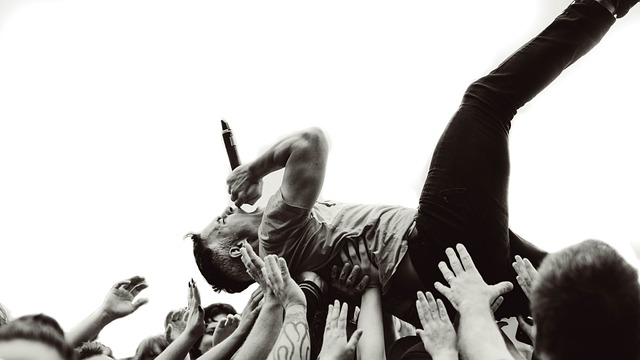
Are you ready to dive into the fascinating world of stand-up comedy?
In this article, we will explore the remarkable evolution of stand-up from its humble beginnings in comedy clubs to becoming a prominent fixture in prime time entertainment.
From early pioneers who paved the way, to breaking barriers and challenging societal norms, we will uncover how stand-up has made its way into our living rooms.
Get ready for an insightful journey that explores the impact of stand-up comedy on society and why it continues to captivate audiences seeking freedom and laughter.
Key Takeaways
- Stand-up comedy emerged as a response to changing entertainment preferences during the vaudeville era.
- Stand-up comedy gained popularity for its relatability and ability to provide escapism.
- Stand-up comedy has evolved to reflect current events and social issues.
- The influence of stand-up comedy on television has shaped cultural conversations and made the art form more accessible.
The Birth of Stand-Up Comedy
You may not realize it, but stand-up comedy was born out of the vaudeville era and quickly became a popular form of entertainment. In the early 20th century, as vaudeville shows began to lose their appeal, comedians started performing solo acts in small clubs and theaters. This shift allowed them to connect directly with audiences and experiment with new comedic styles. Stand-up comedy gained popularity during this time due to its relatability and ability to provide a much-needed escape from the realities of everyday life.
Historically, stand-up comedy emerged as a response to societal changes and cultural shifts. It offered a way for people to laugh at themselves and find humor in the mundane aspects of their lives. As society evolved, so did stand-up comedy, adapting to reflect current events and social issues.
In conclusion, stand-up comedy has come a long way since its birth in the vaudeville era. Its popularity has grown exponentially over the years, captivating audiences with its unique blend of humor and social commentary. Through its historical context, we can better understand how this art form has evolved into what we know today - from humble beginnings in small clubs to prime time television appearances.
Early Pioneers and Influences
Starting in the early days, a number of influential comedians paved the way for the development and popularity of stand-up comedy. Comedy duos played a significant role in shaping this art form. These comedic pairs, such as Laurel and Hardy or Abbott and Costello, brought a unique dynamic to the stage with their contrasting personalities and impeccable timing.
They captivated audiences with their witty banter, physical comedy, and hilarious skits. Vaudeville acts also had a profound influence on stand-up comedy. These variety shows featured a mix of performers including comedians who would entertain audiences with their quick wit and comedic routines.

Through their performances in vaudeville theaters across the country, these pioneers laid the foundation for what would become modern stand-up comedy. Their legacy can still be seen today in the countless comedians who continue to make us laugh on stages big and small.
Breaking Barriers and Challenging Norms
Get ready to witness how comedians have been able to break barriers and challenge societal norms through their bold and boundary-pushing performances.
Stand-up comedy has become a platform for addressing important issues of gender representation and cultural diversity, allowing comedians to use humor as a tool for social change. Female comedians like Amy Schumer and Ali Wong have fearlessly tackled topics such as body image, sexuality, and motherhood in ways that were once considered taboo. Their unapologetic approach has not only challenged traditional gender roles but also paved the way for more women to enter the male-dominated field of stand-up comedy.
Cultural diversity is another area where comedians are making a significant impact. Performers like Hasan Minhaj and Trevor Noah have used their platforms to shed light on racial stereotypes, immigration issues, and discrimination. By sharing their own experiences and perspectives, they are helping to create a more inclusive comedic landscape that reflects the diverse society we live in.
Comedians today understand the power they hold in influencing public opinion and challenging societal norms. Through their performances, they are breaking down barriers, promoting equality, and encouraging open dialogue about important social issues. As audiences continue to desire freedom from outdated ideologies, stand-up comedy remains an influential force for change.
Stand-Up Goes Mainstream: From Clubs to Television
Experience the transition from intimate comedy clubs to the mainstream as stand-up comedians take center stage on television networks. Stand-up specials and late night hosts have played a crucial role in bringing stand-up comedy to a wider audience. These televised performances provide a platform for comedians to showcase their talent and connect with viewers in the comfort of their own homes.
Stand-up specials, such as those featured on streaming platforms like Netflix, have revolutionized the way we consume comedy. Comedians can now reach millions of people worldwide with their unique brand of humor. Late night hosts, like Jimmy Fallon and Conan O'Brien, regularly feature stand-up segments on their shows, further exposing audiences to up-and-coming talent.
Television has allowed stand-up comedy to become more accessible than ever before. Viewers no longer need to venture out to crowded comedy clubs; they can simply tune in from the comfort of their living rooms. This shift has democratized the art form, giving comedians greater exposure and freedom to experiment with their material.
Stand-up's evolution from clubs to prime time has opened doors for diverse voices and perspectives in comedy. It has provided a platform for underrepresented groups, challenging societal norms through humor. As stand-up continues its rise in popularity on television, it will undoubtedly continue pushing boundaries and entertaining audiences with its unique blend of wit and honesty.

The Impact of Stand-Up Comedy on Society
The prevalence of stand-up comedy on television has had a profound influence on society, shaping cultural conversations and challenging societal norms.
Stand-up comedians have become powerful agents of change, using their platforms to address important social issues and provide insightful commentary.
Through their jokes and storytelling, they highlight the need for inclusivity and representation in entertainment, pushing for more diverse voices to be heard.
They tackle topics such as race, gender, sexuality, and politics with sharp wit and thoughtful observations.
By doing so, they not only entertain but also educate audiences on these pressing matters.
Stand-up comedy has become a vehicle for social criticism, exposing the flaws in our society and sparking meaningful discussions.
It has the power to unite people through laughter while also prompting them to question and challenge existing norms.
Frequently Asked Questions
Stand-up comedy can be a viable career option, with earnings varying. Streaming platforms like Netflix have had a significant impact, providing comedians with more opportunities and potentially higher earnings through specials and increased visibility.
What is the most famous stand-up comedy routine of all time?
The greatest stand-up comedy routine of all time is subjective, but one that has had a huge impact on popular culture is Richard Pryor's "Live in Concert." With its raw honesty and social commentary, it pushed boundaries and paved the way for future comedians.

On average, it takes a stand-up comedian several years to become successful. The time can vary depending on factors such as talent, determination, networking skills, and the ability to connect with audiences.
Are there any notable stand-up comedy acts that have failed to break into the mainstream?
Failed stand-up acts are not uncommon in the entertainment industry. Social media has had a significant impact on stand-up comedy, allowing aspiring comedians to gain exposure and connect with audiences worldwide.
Stand-up comedy, improv, and sketch comedy have key differences. Stand-up relies on one person delivering prepared material, while improv is spontaneous and collaborative. Sketch comedy involves scripted sketches performed by a group. Stand-up's impact on pop culture is significant as it reflects societal issues and challenges norms.
 SportsHollywoodLifestyleFashionHome & GardenTrendsPrivacy PolicyTerms And Conditions
SportsHollywoodLifestyleFashionHome & GardenTrendsPrivacy PolicyTerms And Conditions
